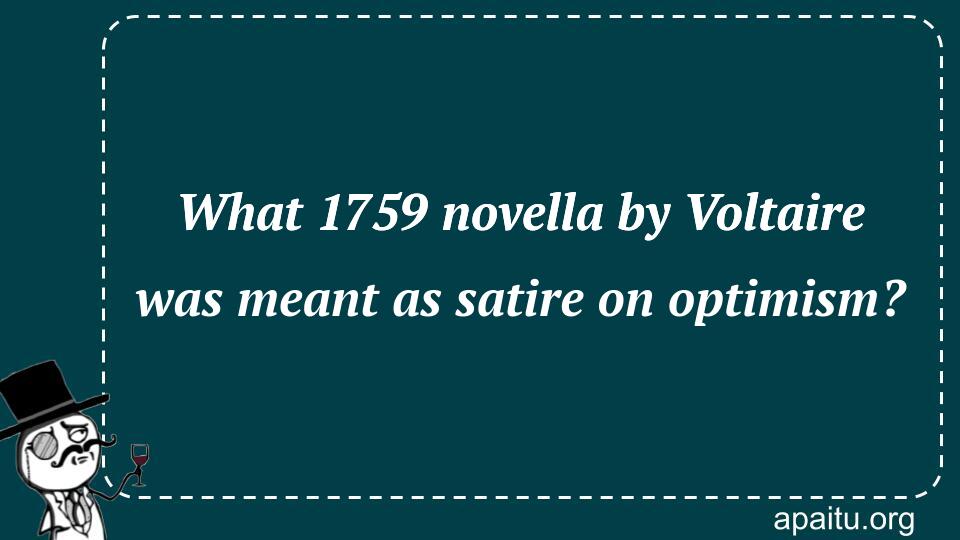Question
Here is the question : WHAT 1759 NOVELLA BY VOLTAIRE WAS MEANT AS SATIRE ON OPTIMISM?
Option
Here is the option for the question :
- Oedipus
- Candide
- Henriade
- Le Micromégas
The Answer:
And, the answer for the the question is :
Explanation:
In “Candide,” the title character adopts Gottfried Leibniz’s optimistic outlook that people exist in the finest possible universe. Candide loses faith in Leibnizian philosophy as he encounters the harsh facts of life. Voltaire, known for stirring up controversy, used this novella to openly criticise and reject Leibniz’s philosophy.

Candide: Voltaire’s Satirical Masterpiece on Optimism
In the realm of literature, Voltaire stands as a prominent figure of the Enlightenment era, known for his wit, intellect, and sharp critique of societal norms. Among his many works, one novella stands out as a scathing satire on the concept of optimism—Candide. Published in 1759, Candide challenges the prevailing philosophical belief in the inherent goodness of the world and offers a biting critique of blind optimism. This article delves into the themes, characters, and impact of Voltaire’s Candide, highlighting its enduring relevance and profound satirical commentary.
Candide follows the eponymous protagonist, a naïve and innocent young man, on his tumultuous journey through a world filled with injustice, violence, and suffering. The novella is a satirical exploration of the philosophical theory of optimism, which posits that the world is inherently good and that everything happens for the best. Voltaire, through his sharp wit and biting irony, exposes the flaws and contradictions of this belief, challenging the notion that all is for the best in the best of all possible worlds.
The story of Candide takes the reader on a rollercoaster of events, as the protagonist faces one misfortune after another. From witnessing horrific acts of violence to experiencing natural disasters and enduring personal tragedies, Candide’s journey is a constant reminder of the harsh realities of life. Through his encounters with various characters, including the pessimistic philosopher Martin and the disillusioned old woman, Voltaire presents contrasting perspectives that challenge the optimism espoused by the character of Pangloss.
Pangloss, Candide’s tutor and the embodiment of blind optimism, serves as a primary target of Voltaire’s satire. Despite the adversity and suffering he and Candide face, Pangloss stubbornly clings to his belief that everything is for the best. Through Pangloss, Voltaire exposes the absurdity of blind faith in optimism and the intellectual dishonesty that often accompanies it. The character becomes a symbol of the naïve optimism that fails to acknowledge the harsh realities of the world.
Voltaire’s satire in Candide extends beyond the critique of optimism. The novella also takes aim at various societal institutions, including organized religion, government, and the aristocracy. Voltaire uses humor, irony, and exaggeration to expose the hypocrisy, corruption, and moral bankruptcy that he perceives in these institutions. Through his characters and their experiences, Voltaire presents a scathing indictment of the prevailing structures of power and authority.
Candide’s enduring relevance lies in its ability to provoke thought and spark critical examination of the world we inhabit. Voltaire’s critique of blind optimism serves as a cautionary tale against complacency and a call to confront the realities of injustice, suffering, and inequality. By challenging the pre